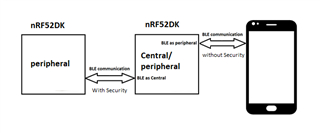Hello
I'm using SDK 15.2 on nRF52 DK to test the ble_app_multirole_lesc example.
I downloaded the code to nRF52 DK to act as central.
I commented the scan_start() function then I downloaded the code to the other nRF52 DK to act as peripheral.
A secure BLE connection is established between the two DK.
Now I want to connect the central DK to smartphone without any security or bonding, but the connection can't be established.
I have modified the hrs init params in the main.c as following in the Central DK
hrs_init_params.hrm_cccd_wr_sec = SEC_OPEN ;//SEC_MITM;
hrs_init_params.bsl_rd_sec = SEC_OPEN ; //SEC_MITM;
but still the connection between Central DK and a smartphone can't be established.
Is it possible to activate the security as Central and disable it as Peripheral for the same device(figure below)?

Best regards


